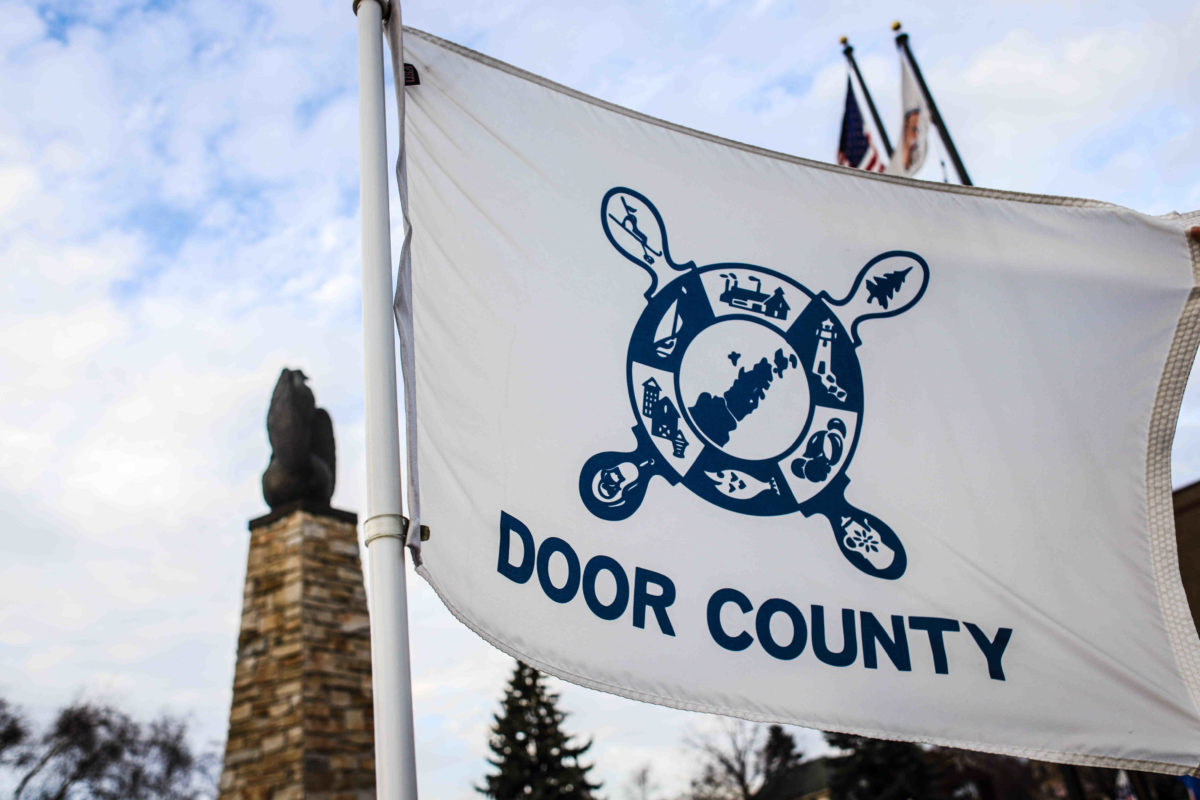For the third month in a row, the Door County Board of Supervisors listened to public comments regarding an Open Door Pride month proclamation proposal. The July 22 regular meeting was also the first time any supervisors spoke on record about the ongoing issue.
The proposal was submitted by Open Door Pride in May and was not placed on the May agenda for discussion. At that same meeting, the board voted against including the proposal on a future agenda with 8 supervisors voting in favor of its inclusion and 13 voting against.
Members of Open Door Pride and the local LGBTQIA+ community have appeared at the monthly meetings since May to encourage the board to at least discuss the pride proclamation proposal.
During the June 24 board meeting, Jesse Simcox, the Wisconsin leader of Gays Against Groomers and his supporters commended the board on not issuing a pride proclamation. Simcox made unsubstantiated allegations against Open Door Pride members and their allies of child grooming and child sexual abuse.
GAG is a nonprofit organization that campaigns against gender-affirming care for minors, and protests against LGBTQIA+ themes or content in schools, among other activism. The organization is considered to be an anti-LGBTQ+ extremist organization by the Anti-Defamation League and the Southern Poverty Law Center.
During the July 22 meeting, Open Door Pride founder Cathy Grier defended herself and her organization against Simcox’s allegations. Additionally, Grier was granted a temporary restraining order for harassment against Simcox on June 25 by the Door County Circuit Court. An injunction hearing to extend the order is scheduled for August 29.
District 7 Supervisor Claire Morkin, representing parts of Sturgeon Bay, said several constituents have spoken to her over the last few months in support of the LGBTQIA+ community in Door County and expressed concern for their safety.
Morkin read part of a letter she received from one of those constituents. The letter stated: “I find it important to voice concern over GAG, the group, and hope that the county board shows Cathy and the LGBTQIA+ community that their safety and belonging are of importance.”
Morkin added, “I think as a board if we allow people to give voice to misinformation and lies, which was presented very emotionally to all of us during the (June) meeting … we run the risk of causing greater division instead of an effort to understand each other. I would like this conversation to continue and to find some common ground and resolution and understanding with this very important community.”
District 9 Supervisor Ryan Shaw, representing parts of Sturgeon Bay, also addressed fellow supervisors regarding the board’s inaction and lack of discussion surrounding the pride proclamation request and misleading and inaccurate public comments.
“We’ve tried to push this issue aside, we’ve tried to sweep this issue under the rug. We’ve tried to not talk about this issue,” Shaw said. “That’s where violence comes. Violence, as we’ve talked about, violence comes in lots of forms, and that can be words, that can be actions, that can be people not feeling comfortable on the street … I’m happy to have these conversations, but we can’t pretend that this isn’t something that’s happening in our community any longer. I ask you to start to talk about it and address it and have an open dialog about what’s going on.”
Both Morkin and Shaw voted in favor of including the Pride proclamation proposal on the June agenda. No other supervisors have spoken publicly about the topic. Sturgeon Bay, Sister Bay and Baileys Harbor have all issued Pride proclamations in recent years.
June is celebrated as Pride month by the LGBTQIA+ community and their allies. Open Door Pride and Northern Door Pride, two Door County LGBTQIA+ nonprofit advocacy groups, both hosted events to commemorate the month.
The 9th annual Open Door Pride festival was held in Sturgeon Bay on June 28, and over 1,200 people attended. Fifty vendors and at least 45 volunteers participated in the event. A representative from Gov. Evers’ office presented Open Door Pride with a proclamation from the governor’s office, and Sen. Tammy Baldwin sent the organization a letter of congratulation following the event, according to Tracy Vreeke, vice chair of Open Door Pride.
Northern Door Pride hosted several events throughout the month of June, including the fifth annual Northern Door Pride festival in Sister Bay and a discussion panel titled “Seek and Understand.” The panel hosted four speakers on topics ranging from immigrant and black experiences to allyship and gender identity.
Additional items
Broadband funding paused, county responds to federal policy changes
Door County’s efforts were a major contributor to Wisconsin receiving over $1 billion in Broadband Equity, Access, and Deployment program funding, thanks to all the survey work the county did in 2022, according to Jessica Hatch. The BEAD program was developed to get internet access to unserved and underserved communities, particularly rural ones.
Now, new guidance from the federal government is leaving local fiber-to-the-premises, or FTTP, plans and funding in limbo, she said.
Hatch is the broadband coordinator for the county, and in a presentation on July 22 to the county board, she outlined how federal changes announced in June will affect Door County’s broadband projects.
“Sadly for Wisconsin, we were just finishing our second round of funding.” Hatch said. “And for us as a county, almost every single project unit that we had was bid on for fiber-to-the-premise and had been awarded. All of that had to be rescinded and now we’re in the middle of an auction round, the BEAD BOB.”
BOB stands for Benefit of the Bargain, and means internet service providers need to go through a new grant allocation round and resubmit bids to the Wisconsin Broadband Office by July 28. The broadband office will in turn submit a statewide plan to the National Telecommunications and Information Administration by Sept. 4. The state will know whether that plan is approved within 90 days, according to Hatch, and the outcomes are uncertain.
“They (providers) had three years of planning and time to run auction rounds, and now they have 90 days to change that,” she said. Auction rounds refer to the competitive process to secure BEAD grant funding, including providers submitting bids on areas in need of service.
The policy change removed language from requirements for awarding funds, including:
- Local coordination and stakeholder engagement
- Fair labor practices and highly skilled workforce
- Civil rights and nondiscrimination law compliance
- Contracting with small and minority businesses, women’s business enterprises, and labor
- Climate resilience
- Open access and Net Neutrality
- Middle class affordability
The biggest impact to Door County, Hatch said, is that there is no longer any priority given to fiber-to-the-premises technology. The funding is now “tech neutral,” she said, meaning providers can bid with anything from satellite to wireless, as long as minimum speeds are maintained. Scoring for the awards is now based on the lowest cost per location.
In a phone call after the meeting, Hatch clarified that fiber is the best option for Door County and other parts of northeastern Wisconsin because of the geography and geology of the areas.
“Will some of these technologies still provide us better service than we currently have available? Absolutely. Will they require us to go back to the drawing board and upgrade them and do all these things? Yes, that’s kind of what’s happened before,” Hatch added.
Additionally, local engagement, municipal resolutions and support from partners is no longer considered in the scoring process, Hatch said, but that does not mean all the county’s legwork is for naught.
“The work that we did and the planning and the conversations and the community awareness and everything, that’s still a massive benefit to us,” she said. Places without internet access or with limited access and are eligible for funding have been identified by the Door County broadband office.
“We understand the lived experience of our community a lot better,” Hatch said.
Wisconsin has not had any BEAD funding cut, but there may be changes to where the funding is awarded, what providers receive funding and what kind of technology will be used to provide internet access to unserved and underserved populations.
Hatch said she will be “anxiously awaiting” NTIA’s determinations, and her office should have that information by the end of the year.
County changes public safety cost-sharing in response to municipal outcry
Between May and July, the Door County board received a flurry of resolutions from municipalities protesting the original public safety communication equipment subscription fees.
In response, the judiciary and public safety, finance, and administrative committees approved a resolution about cost sharing related to the new system on July 15 at a joint meeting.
In 2023 Door County began upgrading their emergency communications from an analog system to a digital one. The county received a $3.9 million grant in 2024 to help pay for the upgrade, but the entire cost is estimated to be close to $25 million.
In May 2025, the county communications advisory technical subcommittee recommended to the administrative committee that municipal emergency services and fire departments pay an annual subscription and maintenance fees, which include a charge of $50.00 per pager and $459.38 per other device.
For the Brussels, Union and Gardner, or BUG fire department, the proposed fees would mean $44,435.05 added to their annual budget. Paul DeWitt, Town of Gardner chairman, addressed the county board on July 22, explaining BUG’s opposition to the fees.
“BUG’s budget is only about $200,000 so we’re looking at a 25 percent increase in our budget just for these radios every year. And where are we going to get that money with levy limits and everything? So I would hope that as this discussion moves forward on this topic, the county looks at funding it … we don’t have the capability of coming up with that kind of money,” DeWitt said.
BUG, Gibraltar, Jacksonport, Union and Clay Banks all submitted resolutions to oppose the subscription fees. An updated cost-sharing plan, decided on at the joint meeting on July 15 partially in response to municipality opposition, was presented to the county board as Resolution 2025-65.
The resolution states that the county will make a one-time purchase of all portable radios, desktop stations and pagers for municipal law enforcement, fire, and emergency response agencies. Maintenance and replacement of the equipment will be the responsibility of the municipalities, at a much lower cost than the previously outlined subscription fees.
For example, instead of more than $44,000 annually, BUG will be responsible for $2,892.50 biannually, though the exact dollar amounts may be subject to change, according to District 21 Supervisor Joel Gunnlaugsson. Gunnlaugsson represents the towns of Liberty Grove and Washington Island and serves on the judiciary and public safety committee.
The county will absorb the larger costs, Gunnlaugsson said in a phone call following the meeting, and it makes more sense for the county tax base to bear the brunt of the expense rather than individual towns and departments.
A combination of county unassigned funds and municipal bonds will support the upgrade expenses, he added, but it remains to be determined exactly how much money will come from what source. At this point, it was about taking the expense off of the municipalities and departments, Gunnlaugsson said.
“And rightly so,” he added.
A memorandum of understanding and more details will be drafted as the purchasing and upgrade process moves forward, according to discussion. The motion to adopt the altered cost-sharing plan was approved by voice vote of the board.

